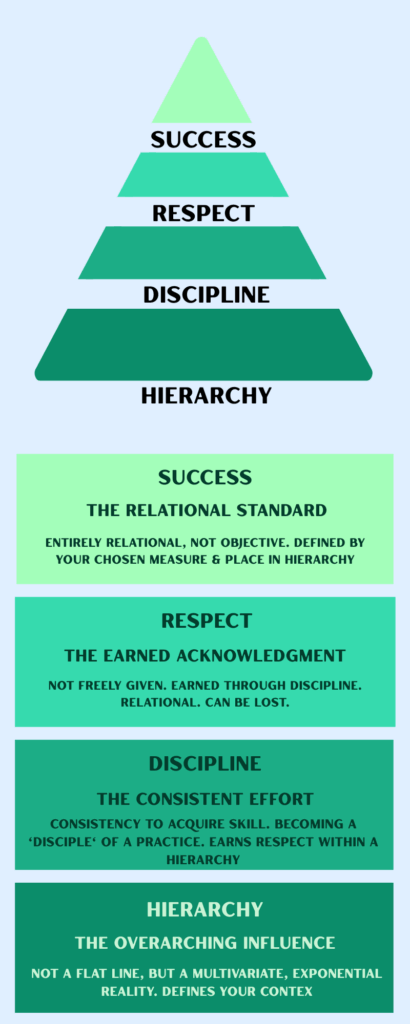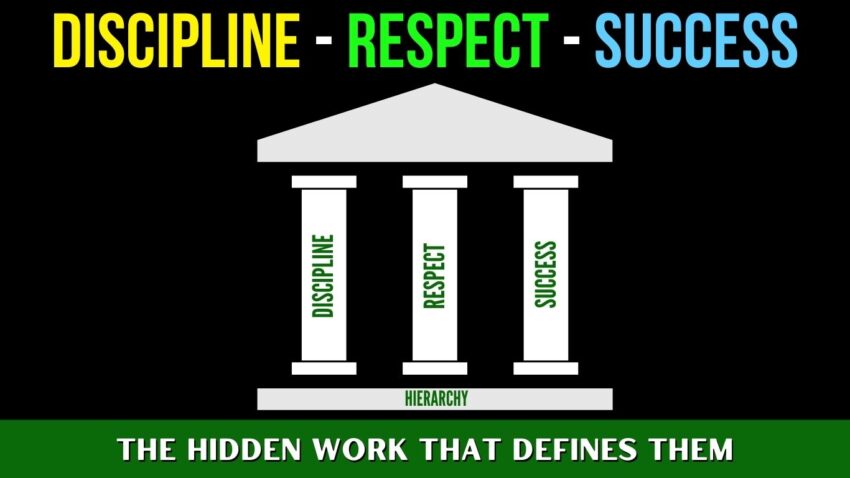The Hidden Rules of Discipline and Respect
I’m going to take a moment to discuss some critical concepts that I believe are often misunderstood in our modern world: discipline, respect, and success. Now, this can be a bit tricky, because all of this is deeply embedded in the idea of hierarchy, a topic I haven’t fully explored in a dedicated video yet because it’s genuinely hard to articulate in a way that truly resonates. So, I ask you to bear with me as we unpack how these three seemingly simple ideas are actually interconnected and why that matters profoundly to you.
What is Discipline, Really?
First off, let’s talk about discipline. When I think about it, discipline boils down to a type of consistency. It’s not just about hitting the gym three times a week, or even six times a week, rotating your leg and arm days. Those are certainly forms of discipline. But there’s also the sense of “disciplines” as in subjects or skills you’re good at. The real implication here is that to acquire that skill, you’ve had to be disciplined. You’ve become a “disciple” of that particular skill, using your discipline to become truly disciplined in it. That might sound trivial, but as Jordan Peterson often says, precise speech matters, and the way we use these terms is important.
The Earned Nature of Respect
Now, your discipline can earn you respect. Why? Because most people simply aren’t disciplined, or at least not about the specific thing you are. That uniqueness, that consistent effort, is what sets you apart and commands respect. It’s a fundamental way to earn it. And here’s the kicker: respect should be earned. It’s granted by someone else. It’s not a freely given thing, independent of other factors. Like discipline, it’s relational. I might respect my rose bushes for their beauty, but also for their thorns—a different kind of respect, acknowledging their danger. There’s also the default respect we should extend to people, treating them with good faith and openness, assuming they have something to say or that we can learn from them. But ultimately, that initial respect can be lost if it’s not reciprocated or deserved.
Success: A Relational, Not Objective, Standard
Then there’s success. This is where things get even more complex, because success is also entirely relational. What does it truly mean to be successful? How would you even know until the very end? You might be a “successful software engineer” because you have the respect of your peers, or because you make a quarter-million dollars a year. These are different measures, aren’t they? Success isn’t some objective, straightforward standard out there. It’s tied up in its relationship with other things and the particular measure you choose. Money, for instance, correlates heavily with success because it’s an abstraction for value and work. But it’s not success itself; plenty of people have money without having truly “earned” it through work. The money you receive, ideally, corresponds to the value you give, but even that’s not objective. It’s all relative.
The Overarching Influence of Hierarchy
So, what is it all relative to? It’s relative to the hierarchy you’re in – or, more accurately, your place within it. This isn’t a flat, simplistic line of “vertical causality.” It’s a multivariate, exponential equation. Let me give you an example: if your family is full of millionaire lawyers and doctors, and you’re not, they might not consider you a “success.” You might have made different trade-offs, avoiding burnout, enjoying more relaxation, and still living comfortably. That might be a “better success” for you, but it places you at a different point in the hierarchy. Their initial hard work, sacrifices, and the financial returns often put them higher in that complex hierarchy.
This hierarchical reality affects respect directly. People who have put in that hard work and accumulated wealth often command more default respect. It might not always be “correct” or “fair,” but it’s a general rule that civilization has collectively developed over time, and honestly, you’re not smarter than distributed cognition over millennia.
Different parts of the hierarchy specialize in different disciplines. In the past, the noble class had the discipline to concern themselves with the welfare of large groups and institutions. Most people simply don’t have the luxury or perspective to operate at that level; they’re embedded within the group. When you’re focusing on groups and institutions, your decisions impact many, and you must be more conservative, preferring stability over quick changes. Your legacy extends beyond your life. And because you cannot fully understand the perspective of someone operating at that institutional level—someone who doesn’t have to worry about earning a living because their family has ensured it—the respect you show them will be different.
Perhaps the thing you’re disciplined about, your expertise, isn’t important at the group level anymore. That’s a sad reality for you, but it might be good for the group, and frankly, you shouldn’t be able to see that. Your role is to focus on your thing, become disciplined, earn respect, and achieve whatever success you can within your sphere.
This is why I wanted to connect discipline, respect, and success. It’s crucial to differentiate these things and understand them not as flat, disconnected concepts, but as elements connected to a larger framework: hierarchy. Once you start to grasp hierarchy, I believe you’ll gain a better, clearer appreciation for what’s truly happening in the world. You’ll understand why you can’t just follow someone else’s path, like Jordan Peterson‘s. His path isn’t even available to you, because you didn’t start where he did. He’s at a different point in the hierarchy; academia itself is a different point.

Additional Resources
Watch Navigating Patterns‘ video about the Secret Link Between Discipline, Respect, and Success
Articles
How to Think Better – Tools for Sense Making; Review of Models: You vs Others, Connection, Participation and Co-Manifestation, and Higher Aim and Reverence


